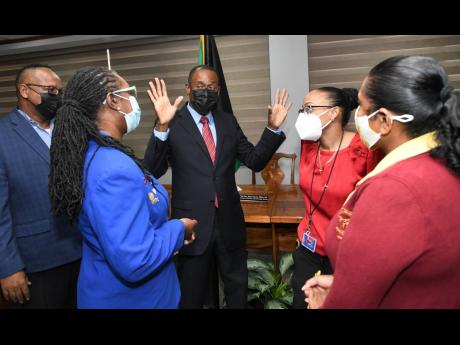Clarke holds cards to chest as unions demand hefty hikes
President of the Jamaica Confederation of Trade Unions (JCTU), Helene Davis Whyte, says that while progress has been made on the public-sector compensation review, workers who have been hit hard by sharp increases in inflation are anticipating a big hike in wages.
“Members have indicated that they really need to see some substantial increase on their pay to be able to deal with all that has happened with inflation over the last year and a half,” Davis Whyte told The Gleaner on Tuesday.
Consumer price or headline inflation in May was estimated at 10.9 per cent, a near one-percentage-point decline from 11.8 per cent in April. However, the rate is far higher than the optimal range of four to six per cent.
Quizzed on whether the Ministry of Finance will take into account inflation as part of the public-sector compensation review, portfolio Minister Dr Nigel Clarke said it was “very premature for me to answer that question”.
Commenting further on the issue during a virtual press conference on Tuesday, Clarke said: “We process those questions around the bargaining table and I would undermine that process if I sought to have that conversation with you instead of with my counterparts around the bargaining table.”
Providing an update on the compensation restructuring exercise, Clarke said that the first round of consultations has been completed with all public-sector unions and second-round talks are now under way.
He also disclosed that public-sector workers who earn at the lowest levels will receive support for back-to-school expenses before the compensation restructuring takes effect. Clarke indicated that the assistance comes in the context of the global inflationary pressures.
In May, Clarke had said that consultations with the unions over the restructuring of compensation for public-sector workers should be completed by November.
His comments came amid a flurry of industrial action by air traffic controllers, and employees of the National Water Commission and the National Housing Trust.
Davis Whyte said that while the current dialogue does not involve the same process as regular wage negotiations, the timeline to complete the exercise is important as the workers could not wait indefinitely to receive the new compensation.
She said that progress has been made so far based on the meetings that have been held to date but a lot depends on the ministry’s response to the proposals made by the unions.
Davis Whyte said that members of the JCTU are expecting a follow-up response from the ministry by the end of this week.
“While we are seeking to ensure that the numbers are correct and that as best as possible, the majority of our members will be in a more advantageous position than they were before, at the same time we have to balance that against the time constraint because we do know that our members are buckling now under the weight of increasing inflation over the period,” the JCTU boss said.
Patsy Edwards Henry, president of the Nurses Association of Jamaica (NAJ), said the last proposal submitted by the Ministry of Finance to her association was now being analysed by the nurses.
The NAJ has employed a consultant to work with the union on the compensation review process.
The association said its membership has highlighted concerns and has suggested how these can be resolved.
“We are having continuous dialogue with the Government. We are not satisfied but we are not totally dissatisfied.”
Edwards Henry said that as part of the public-sector compensation review, the Government is moving towards a 40-hour workweek and then for overtime to trip in. She said this would present a problem for service delivery if there is an insistence that nurses must work their 40 hours.
Nurses are not paid overtime but compensated on a sessional basis.
“If a nurse is able to complete her 40 hours between Sunday and Wednesday or Monday and Thursday and she decides that she is not going to do overtime, there is going to be challenges for us meeting the staffing needs, especially on the weekend,” said Edwards Henry.

